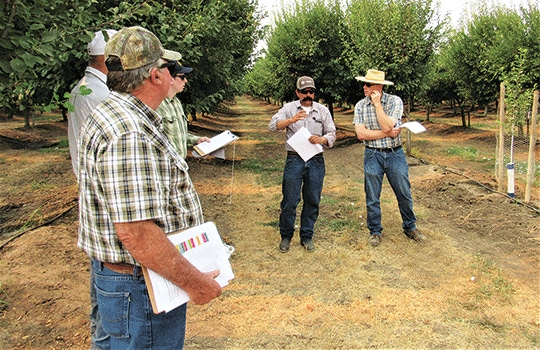
Ask any farmer, professor of agriculture, or Extension advisor, and most will tell you that regardless of how many years of farming you may have under your belt, there is always something new to learn.
Whether you grow cotton, corn, vegetables, tobacco, or any other commercial crop, or your farming focus is on raising beef cattle, hogs, goats or some other type of livestock, chances are good that while new advances in technology may lead the way in our need to continue learning the art and science of agriculture, increasing diversity in modern farming dictates we never turn our back on opportunities for professional growth.
The truth is, while our forefathers may have focused on a single crop as the backbone of their farming operation, modern farmers are forced to diversify. Cash crops, cover crops, specialty crops, livestock operations — the list of layered farm disciplines is growing, and with it the need to learn about new aspects and products of agriculture to diversify offerings and incorporate them into our 21st century farming operations.
The University of California Davis Fruit and Nut Center has been leading the way in helping farmers expand their knowledge of farming, especially as related to fruit and tree nut cropping systems.
“Some California farmers have demonstrated an interest in diversifying their cropping operations and have added other types of crops to their offerings,” says Kevin Taniguchi, acting manager of the Fruit and Nut Center. “For 10 or so years now the UC-Davis Fruit and Nut Center has been offering an annual and comprehensive course called the Principles of Fruit and Tree Nut Growth, Cropping, and Management that has proven to be popular and successful.”
SEEKING OTHER OPPORTUNITIES
In average years the course has more applicants than there are participant spaces available. “A good number of participants each year are already farming other types of crops and are looking at other agricultural opportunities,” he says. “Some have recently purchased or are in the process of acquiring an existing orchard operation, and a few are looking at new start-ups.
“While most of our course participants are historically from California, we have had participants from as far away as the Mediterranean region who have made the trip out to California to be included in the course.”
According to Taniguchi, the annual course includes nine full days of instruction. The first five days will be held on the UC-Davis campus and include lectures, laboratory exercises, and field demonstrations. The following week, participants will travel by commercial bus on a four-day field trip throughout fruit and nut tree-growing regions of northern and central California.
Farms, processing facilities and other relevant points of interest are scheduled to help participants understand the potential of fruit and nut production.
“I would say the largest number of our course participants in recent years have mostly been interested in tree nut aspects of the course,” he says. “Others are there to learn about fruit production, and a few are interested in both.”
EMPHASIZING PLANT BIOLOGY
Understanding the fundamentals of tree biology is essential, Taniguchi says, to making sound orchard management and business decisions in the fruit and nut tree industry. However, he cautions that access to educational courses on basic fruit and nut tree biology, and how it relates to agronomic practices is limited. The course provides information with an emphasis on all aspects of basic plant biology and the relationship between plant biology and nuts and fruit orchard management.
The course is generally limited to a specific number of participants — up to as many as 75 participants each year in the past. As a result of recent tariff and trade challenges, Taniguchi says they could have fewer participants from abroad this year, but most interest comes from people who are native to or live in California or U.S. western states.
Each year a waiting list is maintained and, as of last count, about 50 participants are planned for the 2019 course, which gets under way Feb. 25 and runs through March 7. Participants interested in registering can and are encouraged to do so online.
The price for the first week lecture/labs course that runs from Feb. 25 through March 1 is $1,850 and includes course materials, small breakfast/coffee breaks and lunches, and an evening graduation reception. Accommodations are not included during the first week of the course.
The cost of the course for the first and second week of the course combined is $2,850 and includes all of the above plus transportation during the field tours, two lunches, and an evening dinner. The remaining lunches and dinners are not included in the price.
Additionally, $215 is asked for the two nights field tour lodging (in Selma), for a total of $3,065 for the two weeks. If you do not wish to stay at the hotel with the group, you are free to find your own lodging and not pay the $215. However, note that transport to and from different hotels or your home will not be provided.
Taniguchi advises to register early. Follow this link to reserve your space online.
About the Author(s)
You May Also Like






